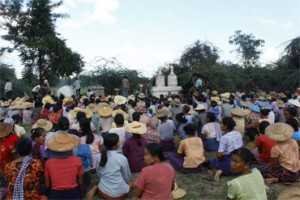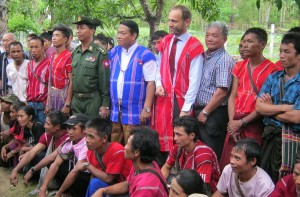Environmental and Economic Justice (103 found)
Giant Chinese Industrial Zone Threatens Burma’s Arakan Coast
A new report by Arakan Oil Watch called “Danger Zone” exposes how a planned Chinese industrial zone is threatening the livelihoods of tens of thousands of people in Arakan State as well as Burma’s second largest mangrove forest.
The 120 sq km Kyauk Phyu Special Economic Zone, planned around the terminals of the trans-Burma natural gas and oil pipelines, will evict up to 40 villages, while many fear the impacts of toxic waste and pollution from petrochemical and metal industries […]
• • •New Report: Women Urge Halt to Expansion of Damaging Karenni Tin Mines
The Mawchi tin mines have inflicted decades of environmental and social damage in southern Karenni State and new expansion plans should be halted, according to a new report by a network of local women.
Lost paradise, by the Molo Women Mining Watch Network, details how hundreds of mine tunnels spanning about 3,000 acres have caused lethal landslides, water pollution and deforestation, impacting about 4,500 indigenous villagers […]
• • •President U Thein Sein: Immediately Investigate and Bring to Justice the Police Responsible for Grave Crimes Committed Against Peaceful Demonstrators
AAPP strongly condemns the use of excessive force and brutality by police officers in response to peaceful protestors in the early hours of 29 November, 2012. The government of President U Thein Sein must ensure […]
• • •Both Sides File Suits in Mine Protest
 Over 1,000 villagers staged a symbolic demonstration on Tuesday at a graveyard to dramatize their struggle against a Chinese co-owned mine in the Letpadaung mountain range near Sagaing Division’s Monywa city.
Over 1,000 villagers staged a symbolic demonstration on Tuesday at a graveyard to dramatize their struggle against a Chinese co-owned mine in the Letpadaung mountain range near Sagaing Division’s Monywa city.
The villagers are protesting their displacement from land following months of confrontations with the company and the authorities […]
• •World Bank grant could ‘exacerbate’ problems in border regions
Civil society groups have urged the World Bank to exercise caution before pressing ahead with their plans to pump $85 million into community projects in Burma’s conflict-torn border regions or risk “exacerbating” local problems.
Campaigners have criticised the Bank for claiming that locals will be able to “decide whether to invest in schools, roads, water or other projects” without disclosing details of their consultation plans, transparency provisions and whether they have conducted a conflict-assessment […]
•Burma Peace Funds Must Do No Harm
 By Paul Sein Twa
By Paul Sein Twa
In the past few months, various media reports have quoted some concerns and opinions of KESAN regarding the ongoing peace process in Burma. This statement clarifies and expands upon these issues.
Our perspective on the peace process and peace funds
Sustainable peace is the long-term vision of Karen people. That vision incorporates rule of law, the protection of human rights, democratic governance, security of livelihood and equitable access to natural resources and essential services. We are not there yet.
Peace funds can be an important tool for building a culture of peace in Burma. Well managed peace funds can serve as positive instruments to advance shared multi-ethnic and government agendas for peace. However, peace funds must contribute to addressing deep rooted and structural obstacles to realizing peace in the country and strengthen community decision making processes to identify the priorities of ethnic people. The effective management of peace funds includes maximum transparency, support for a shared framework for peace, inclusive and meaningful consultation with a wide-range of non-state actors, multi-party dialogues and clear monitoring and accountability mechanisms. What we have witnessed so far is that the current peace fund process falls short of these good practices – and standards […]
Burma: US Backtracks on ‘Responsible Investment’ Pledge
Business Reporting Requirements Won’t Deter Abuses, Corruption
The new United States government policy allowing business activity in Burma’s controversial oil sector with reporting requirements will not adequately prevent new investments from fueling abuses and undermining reform, Human Rights Watch said today.
The Obama administration announced that it will waive longstanding US sanctions on investment and financial services in Burma […]
• • •Breaking: US Government Eases Sanctions on Burma
ERI concerned about risks for human rights, environment
ERI is greatly concerned by today’s announcement that the U.S. will issue General Licenses authorizing U.S. companies to do business in Burma without abiding by international best practices on human rights, environmental performance, and financial transparency. The construction of foreign-owned oil and gas pipelines continues to contribute to conflict and human rights abuses in ethnic minority areas such as Shan State, and companies investing in infrastructure development cause community suffering through forced displacement and environmental destruction throughout Burma […]
• • •Statement on Foreign Investment in Burma
Daw Aung San Suu Kyi made a very important statement today that I call on the Administration and our European allies to heed. She urged foreign governments not to allow their companies to enter into new partnerships at this time with the Myanmar Oil and Gas Enterprise […]
• • •China Power Investment Seeks Backing of Global Dam Industry to Push Ahead with Myitsone Project
Chinese media last week revealed that the International Commission on Large Dams (ICOLD) is currently conducting an “independent” inspection of the Irrawaddy Myitsone dam, being built by China Power Investment Corporation (CPI), to prove that the dam is completely safe and beneficial. Such a study would be a major boost in CPI’s bid to push ahead with the suspended project […]
• • •








 All posts
All posts